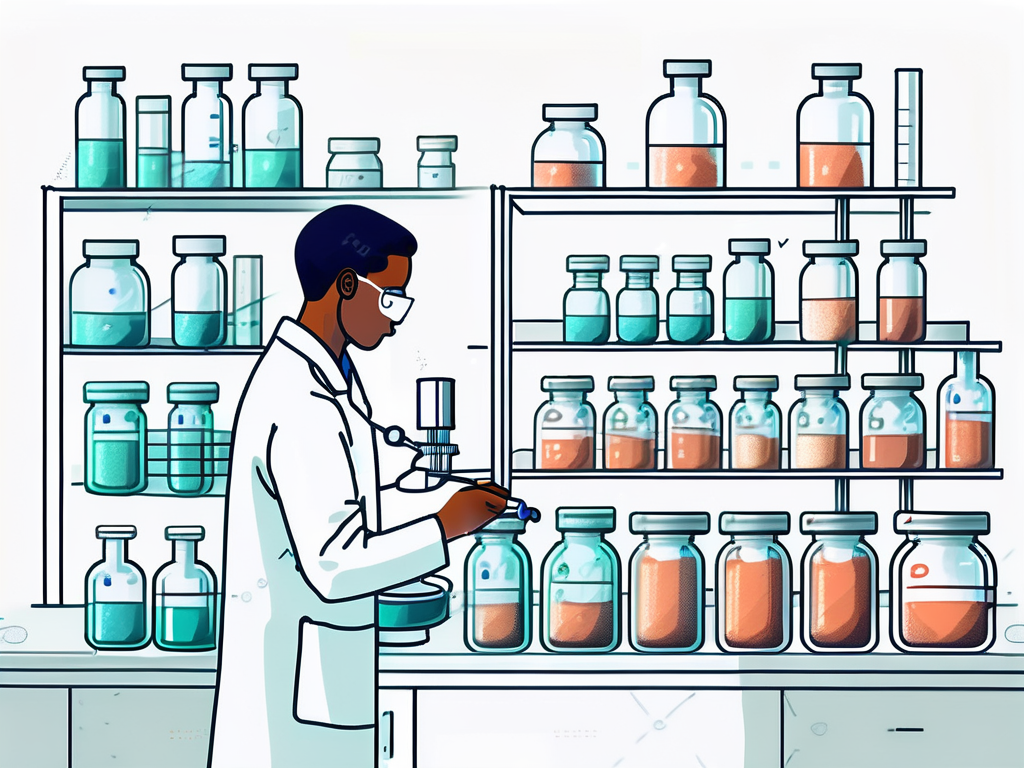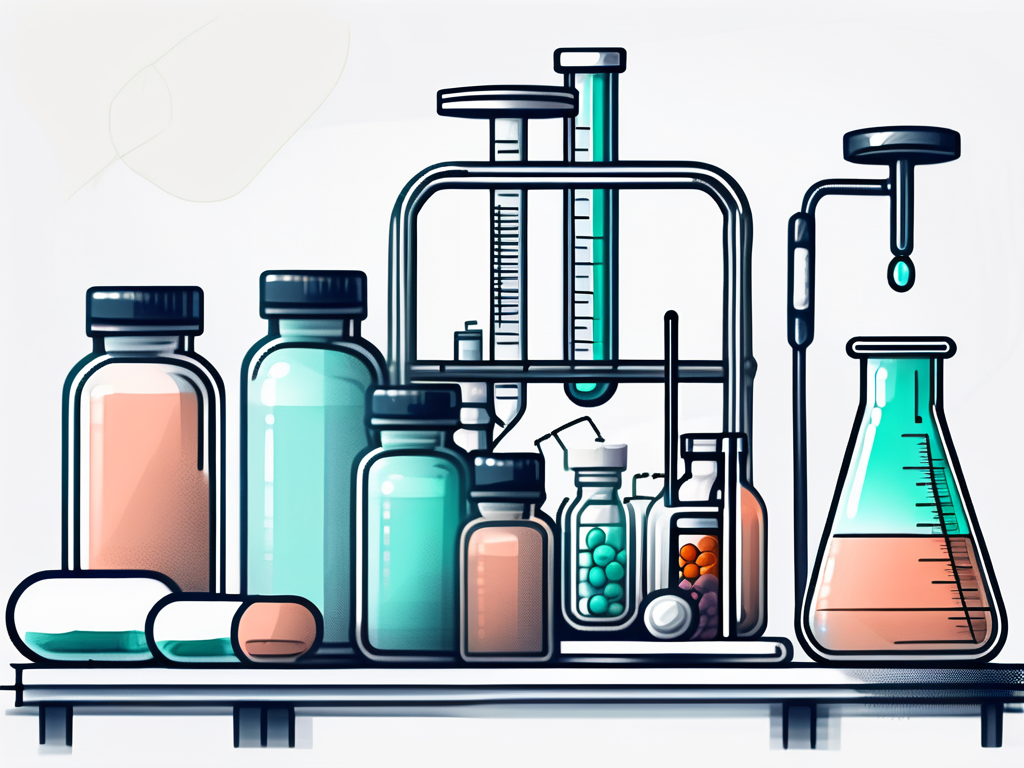Welcome to the world of compounding pharmacy, where the term “pharmaceutical grade” carries a weight of significance. This is a realm where precision, expertise, and a deep understanding of chemistry and biology come together to create custom medications tailored to the unique needs of each patient. It’s a fascinating field, and one that’s often misunderstood or overlooked in discussions about healthcare and medicine.
But what exactly does “pharmaceutical grade” mean in the context of a compounding pharmacy? How does it differ from other grades of pharmaceuticals? And why is it so important? In this glossary entry, we’ll dive deep into these questions and more, exploring the ins and outs of pharmaceutical grade compounds and the role they play in the broader field of compounding pharmacy.
Understanding Compounding Pharmacy
Before we can fully grasp the concept of pharmaceutical grade, it’s important to understand what a compounding pharmacy is. In its simplest form, a compounding pharmacy is a pharmacy that creates personalized medications for patients. These are not your typical off-the-shelf medications; rather, they are custom-made to suit the specific needs of an individual patient.

Compounding pharmacies play a crucial role in healthcare, filling a gap that traditional pharmacies can’t. They provide solutions for patients who have allergies to certain ingredients in standard medications, need a specific dosage not commercially available, or require a different form of medication, such as a liquid instead of a pill.
The Role of the Compounding Pharmacist
The compounding pharmacist is the heart and soul of the compounding pharmacy. These professionals are not just dispensers of medication; they are creators, innovators, and problem-solvers. They work closely with doctors and patients to design and produce medications that meet unique health needs.
Compounding pharmacists require a high level of expertise and a deep understanding of pharmaceutical chemistry. They must be able to accurately measure and mix the correct amounts of active ingredients, ensure the stability and efficacy of the compounded medication, and comply with strict safety and quality standards.
Compounding Pharmacy vs. Traditional Pharmacy
While both compounding and traditional pharmacies provide medications to patients, the way they operate is fundamentally different. Traditional pharmacies dispense mass-produced medications manufactured by pharmaceutical companies. These medications are made in large batches, with standardized dosages and forms.
On the other hand, compounding pharmacies create medications from scratch for individual patients. Each medication is made to order, with the dosage, form, and combination of active ingredients tailored to the patient’s specific needs. This personalized approach allows for greater flexibility and customization than is possible with mass-produced medications.
Defining Pharmaceutical Grade
Now that we have a better understanding of what a compounding pharmacy is, let’s delve into the concept of pharmaceutical grade. In the world of compounding pharmacy, pharmaceutical grade refers to the quality and purity of the ingredients used to make compounded medications.

Pharmaceutical grade ingredients are those that meet the highest standards of purity and are free from contaminants. They must be at least 99.9% pure, meaning that no more than 0.1% of the substance can be made up of unknown or unidentifiable ingredients. This high level of purity is crucial for ensuring the safety and effectiveness of compounded medications.
The Importance of Pharmaceutical Grade
Using pharmaceutical grade ingredients is of utmost importance in compounding pharmacy. The high level of purity ensures that patients receive a medication that is safe, effective, and free from harmful contaminants. This is particularly important for patients with allergies or sensitivities to certain substances, as even trace amounts of a contaminant could cause an adverse reaction.
Furthermore, the use of pharmaceutical grade ingredients allows for precise dosing. Because the ingredients are so pure, compounding pharmacists can accurately measure and mix the correct amounts to create a medication that meets the patient’s specific needs. This level of precision is crucial for ensuring the effectiveness of the medication and minimizing the risk of side effects.
Regulation of Pharmaceutical Grade Ingredients
Pharmaceutical grade ingredients are regulated by the U.S. Food and Drug Administration (FDA) and must meet the standards set forth in the United States Pharmacopeia (USP). The USP is a scientific, nonprofit organization that sets standards for the identity, strength, quality, and purity of medicines, food ingredients, and dietary supplements.
The FDA enforces these standards and conducts inspections of manufacturing facilities to ensure compliance. Any ingredient that does not meet USP standards cannot be labeled as pharmaceutical grade. This rigorous regulation helps to ensure the safety and quality of compounded medications.
Pharmaceutical Grade in the Compounding Process
Pharmaceutical grade ingredients play a central role in the compounding process. The process begins when a healthcare provider writes a prescription for a compounded medication. The prescription specifies the active ingredients, dosage, form, and any other special instructions.
The compounding pharmacist then uses pharmaceutical grade ingredients to create the medication. The ingredients are carefully measured and mixed in a controlled environment to ensure accuracy and prevent contamination. The final product is a medication that is tailored to the patient’s specific needs and meets the highest standards of quality and purity.
Quality Control in Compounding Pharmacy
Quality control is a critical aspect of compounding pharmacy. Because compounded medications are made to order and not mass-produced, each batch must be carefully tested to ensure it meets the required standards. This includes testing for potency, purity, and stability.
Compounding pharmacies must also comply with strict safety standards to prevent contamination. This includes using sterile techniques and equipment, wearing protective clothing, and conducting regular cleaning and maintenance of the compounding area.
Challenges and Solutions in Compounding Pharmacy
While compounding pharmacy provides many benefits, it also presents some challenges. One of the biggest challenges is ensuring the consistency and quality of compounded medications. Because each medication is made individually, there is a risk of variability between batches.
However, compounding pharmacies have developed strategies to mitigate this risk. These include using advanced equipment and techniques, conducting rigorous testing, and implementing strict quality control procedures. By adhering to these practices, compounding pharmacies can ensure the consistency and quality of their products.
Conclusion
Pharmaceutical grade is a term that carries significant weight in the world of compounding pharmacy. It refers to the highest standard of purity for the ingredients used to create custom medications. By using pharmaceutical grade ingredients, compounding pharmacies can ensure the safety, effectiveness, and quality of their products.

While the world of compounding pharmacy can seem complex, it’s all about meeting the unique needs of each patient. Whether it’s creating a medication for a patient with an allergy to a standard drug, formulating a medication in a form that’s easier for a patient to take, or making a medication with a specific dosage, compounding pharmacies are there to provide solutions. And at the heart of these solutions is the commitment to using pharmaceutical grade ingredients.


